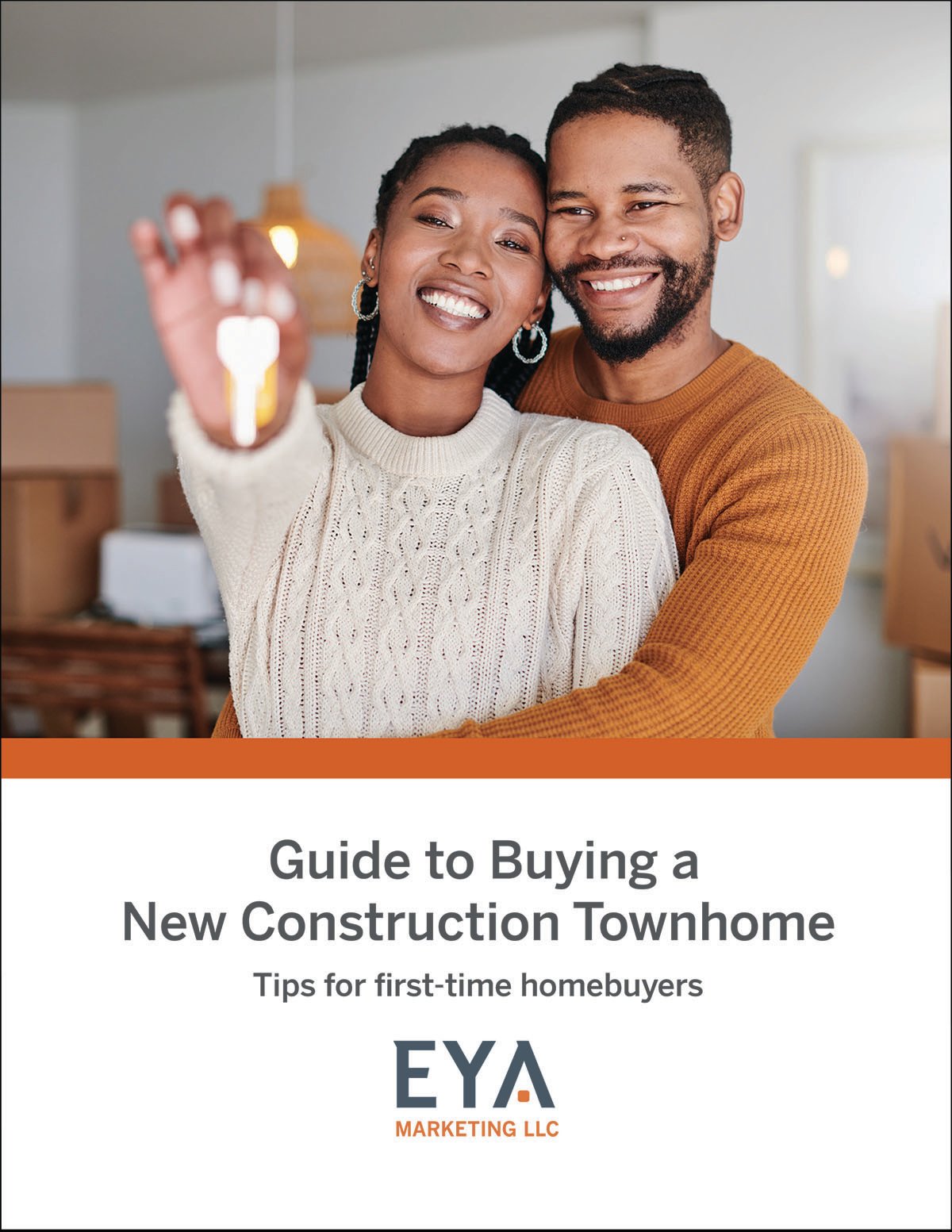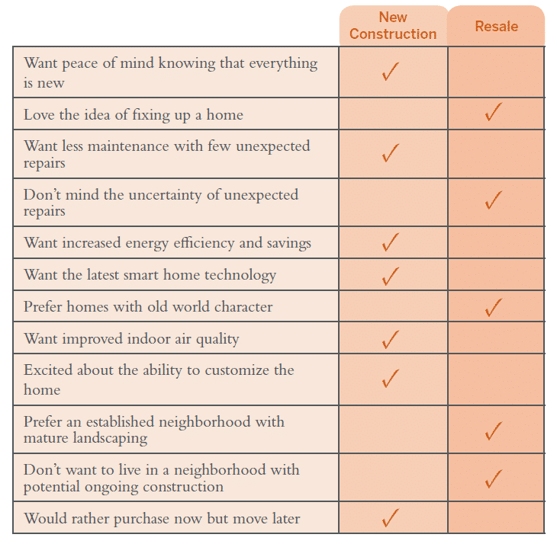
Whether you are a first-time homebuyer or a first-time new construction buyer, you may have a lot of questions about why buying a new townhome may be right for you.
There are many things to take into consideration such as understanding the differences between various types of homes, how to know when you are financially ready to buy a home, the buying and construction processes, as well as determining the lifestyle you want to live and choosing the neighborhood that is right for you.
This guide will walk you through questions to ask yourself about how and where you want to live, compare different types of homes, describe the buying and construction processes and much more.
Or, you can also fill out the form for a downloadable PDF version of the guide you can reference later.

As you start to consider purchasing a home, it is important to understand if you are financially ready. How is your credit? Do you have enough for a down payment? How do lenders assess your loan application? Here are some helpful links to dive in to financially preparing to purchase a home.
Once you know you are ready to buy a home, it is important to understand the process. Many of the steps in purchasing a new construction home are similar to purchasing a resale. You will need to sign a contract, secure a loan from a bank (or show you have the assets to cover the cost of the home) and go through the closing process. However, there are some additional steps in purchasing a new construction home, such as selecting options for the home and meeting with the builder for walk-throughs during various stages of the building process.
While the processes will vary by builder, below is a general overview of the purchasing process for new construction homes.
1) Purchase Agreement
2) Securing a Loan
3) Options Meetings
4) Home Walk-Throughs
5) Closing
6) Home Warranty
Download the Guide for more detailed information on each of the steps of the purchasing process.
If you choose to buy a new home, watching your dream home come to life is an exciting experience and a lot more goes into building your home than you may be aware of. While the following list is not exhaustive of every step included in building a home (and processes may vary by builders), below are the basic phases in the home building process, in approximate order.
1) Building Pad Preparation
2) Framing & Carpentry
3) Rough-In, Air Sealing & Insulation
4) Drywall & Interior Finishing
5) Exterior Finishing
6) Final Walk-Through & Quality Assurance
Download the Guide for more details on the construction process.
And here are a few more helpful links:
When purchasing a resale home, it is typically the seller who pays the Realtor fees. It is similar when purchasing a new construction home, as the builder will typically pay the agreed upon Realtor fees. Be sure you know who will pay all associated fees upfront.
Realtors can be valuable sources of information regarding the reputation of the builder, home price comparisons and more. However, the builder sales representatives are also excellent resources who will have the in-depth knowledge of the local market, the homes, comparable pricing, etc. Whether or not you prefer to work with a Realtor will depend on your own preference. The key is to work with someone you trust and who has the experience, market knowledge and understanding of what you are looking for in a new home and neighborhood.
Now that you know you are financially ready to buy a home, know how much you can afford and understand the process, it's time to think about what type of home you want. When shopping for a new home, you not only have the choice between a condo, townhome or single family home, but also the choice of new construction or resale. Each offers their own benefits depending on your preferences of what you are looking for and the type of lifestyle you want to live.
For example, if you love the idea of rolling up your sleeves and fixing up an older home in an established neighborhood, then perhaps an existing single family home may be right for you. But if you never want to set foot in Home Depot and would rather spend your weekends away, a brand new condo or townhome may be a better lifestyle fit.
Below, we'll take a look at the benefits of different types of homes and talk about other important things to consider, including location, community, lifestyle and more.
Condominiums are typically – but not always – one level and found in multi-story buildings. Units tend to be smaller in square footage than most townhomes and single family homes.
Unlike apartments owned by landlords, individuals purchase and own the unit within their walls. A condominium association owns and maintains the land, building and common areas. It’s joint ownership, and all residents share in the upkeep, common area utilities and insurance.
Condo owners pay a monthly condo fee based on the size of their unit that goes towards the costs of building services, maintenance and repairs and is shared among all owners in the building.
Part of the fee is for keeping systems operational like HVAC, electric, plumbing and elevators. It also entails repairs and maintenance for common areas such as hallways, lobbies, outdoor terraces, amenity rooms and the garage as well as the building’s exterior including roofs, facades, windows and doors, sidewalks, driveways and green spaces.
Condo fees may also cover costs for building amenities including swimming pool, fitness center, security, concierge and parking spaces. The more services included, the higher the fee.
A portion of the fees are also typically put into a reserve fund for larger projects such as building renovations. To cover this broader set of building responsibilities and amenities, significantly higher monthly fees are often charged to condo owners vs. townhome or single family home owners.
Why you may prefer a condo: Condos can offer a low maintenance lifestyle and often come with amenities such as a fitness center, concierge, pool or rooftop terrace.
Keep in mind: Condo fees tend to be higher than homeowner association (HOA) fees for townhomes or single family homes. Be sure to take this into consideration when looking at your budget and monthly costs.
A single family home is most often described as one unit that is not connected to other residential structures. It is detached and sitting on its own parcel of land and owners own both the house and the land.
While not always, single family homes tend to be located beyond the city centers, offering more square footage and yards. Single family homes often provide the space growing families seek, as well as privacy with no shared walls.
With this added space does come added maintenance, including your home's exterior and yard. While some people may love the idea of taking care of a home and yard, make sure not to underestimate the time and money that a single family home may require to maintain and be sure to include this in your budget.
Some single family homes may be part of an HOA, while others are not. HOA fees in single family home communities tend to be significantly less than condo fees, however it is important to understand what may be required or not allowed (such as any required upkeep or renovations that aren't allowed) if part of an HOA.
Why you may prefer a single family home: If you are looking for space, privacy and a yard to enjoy then you may prefer a single family home.
Keep in mind: Single family homes tend to require a lot more maintenance than condos or townhomes so be sure to include these costs in your budget and potential time in your schedule.
Often thought of as the middle ground between a condo and a single family home, townhomes can offer the best of both worlds—more square footage than typical condos with the space to grow but without all the maintenance of a single family home.
In townhome communities, residences are designed in rows and homeowners share at least one wall with a neighbor. Many townhome communities offer amenities that may include private garage parking, open green spaces, a community center and more. With land at a premium in the D.C. metro area, new townhome communities are often built on infill sites, surrounded by established retail, dining, recreation, transit and more.
In townhome communities, the buyer typically owns the structure and land and is responsible for the individual home’s interior and immediate exterior, as well as any private outdoor space. Owners pay an HOA fee that covers common area maintenance.
Townhome HOAs will set and enforce rules that are often associated with home exteriors. They range from policies about major additions like porches and decks to lesser improvements, including satellite dishes, planters and flower baskets, holiday decorations and flags.
Rules may also govern where you can walk your pets, the types of vehicles you can ride in the neighborhood (skateboards, motorized bikes, etc.) and where children can play.
In general, townhome regulations are less comprehensive and only pertain to outside space vs. shared interior areas at condominiums.
Why you may prefer a townhome: If you are looking for more space than a condo to work at home or grow your family, townhomes can offer the space you want, without the yard and home maintenance of a single family home.
Keep in mind: When purchasing a three or four-story townhome, you'll need to embrace the stairs! Studies have shown the benefits of climbing stairs, so you can build it in to your daily workout. Or, there are many new townhomes that offer the option for an in-home elevator as well.
Click to read this blog on the "Top 10 benefits of modern townhome living."
For a further look into the differences of these types of homes, additional resources are below.
Now that you have thought a bit more about what type of home might suit you best, the next question many home shoppers ask is should I buy a new construction home or resale? Whether you ultimately select a condo, townhome or single family home, you have the choice of new or lived-in and which one is right for you can depend on many factors, including lifestyle preference and personal priorities. If your ideal home has the latest new home technology, energy efficient features and requires little to no maintenance, then new construction may be the better choice for you. If you love the idea of fixing up a home and prefer to live in a developed neighborhood with mature landscaping, then an older home may better suit your lifestyle.
Below are some preferences to consider to help you determine which type of home may better suit your lifestyle and priorities.
 Note on prices and costs:
Note on prices and costs:
As discussed above, the price of the home doesn't take into consideration the added expenses such as monthly condo or HOA fees. Just as the price of an older home doesn't take into consideration the potential maintenance costs. While new construction homes may be more expensive upfront, think about what repairs may be needed to an older home and factor these into your budget.
Additional resources:
Below are additional resources to learn more about whether buying new construction or resale may be right for you.
When selecting the type of home that is right for you, a big question to ask yourself is: How do you want to spend your time? Do you want to spend your weekends entertaining in your back yard, taking on renovation projects or traveling? Do you want to be able to walk outside your door to shops & restaurants and even ditch your car?
How you want to spend your time will influence the type of home perfect for your next move. At EYA, many of our buyers choose a new townhome because they are seeking a lock-and-go lifestyle with little home maintenance and more time to do the things they love. They are also drawn to life within walking distance, where they can step out their front door to shops, restaurants, recreation, transit and more.
Click here to watch a video about what a lock-and-go lifestyle means for our homeowners.
More and more, home buyers are seeking walkability in their community. Living in a walkable community may have once been a “nice to have” for home shoppers searching for a new home. However, with a spectrum of studies showing the numerous benefits of these communities (from increased health benefits to improved happiness), walkable neighborhoods have become "must haves" for many.
In fact, there’s a lot of evidence that people who walk in their neighborhoods feel more connected to their community, and being connected to a community is known to make people mentally more resilient and better able to cope with adverse events such as illness or job loss. And even if you don’t meet anyone in particular during these walks, routine encounters with “familiar strangers,” such as neighbors who are out walking their dog in the morning when you are headed to the Metro, can turn into stronger neighborly bonds over time, or even friendships.
While these are some of the many benefits of an urban lifestyle, not all walkable neighborhoods are the same. In order to realize some of these advantages, urban designers say neighborhoods should have plenty of access to green spaces, common-use areas and safe pedestrian crossings. Finally, a walkable neighborhood should promote enjoyment – with the opportunity to engage with neighbors and have easy access to shopping, dining, entertainment, recreation and transit.
While there certainly are single family homes in walkable neighborhoods, condos and townhomes are more typically available in these locations. And while "walkable neighborhoods" were often thought to be more in city centers, there are options beyond the city as well that offer a walkable community such as Bethesda, Old Town Alexandria, Reston Station and more.
Watch this video to hear from our homeowners about what it's like to live in an EYA community.
While the type of home is important to consider, choosing a home in the right location is (and always has been) one of the most important decisions for home buying. Location determines how easy it will be for you to get to work, run errands, visit friends, and get to school, the gym or your favorite meeting spots.
Does the location positively impact your daily routines or commute? Is there public transit; is the community easily accessible by Metro, train or bus? What about walkability? Does it include trails, parks or sidewalks? Does the community offer alternatives such as car sharing and bike sharing?
How can you make sure you’re choosing the right community? If possible, walk or drive around your prospective new neighborhood during different times of the day and week to give yourself a glimpse of what it would be like to live there. Good times to visit are during the weekday morning and evening rush hours, as well as during a weekend. Talk to friends in the neighborhood to learn about what its like to live there and to a broker or city official to learn about any future plans for the area.
Read this article for more info on choosing the location right for you.
The Washington, DC metro area has so much to offer with a wide variety of neighborhoods. From DC to Rockville to Reston, there is a neighborhood just right for everyone. Here are some key questions to ask yourself when selecting your next neighborhood:
Below are a few helpful links to give you a feel for some of the DC area neighborhoods.
Still unsure which neighborhood is best for you? Take our neighborhood quiz! Click here to take the quiz.
All types of homes have their benefits and it depends on what you are looking for in your next home. Townhomes typically offer more space than a condo, as well as some nice features of a single family home (such as private garage parking and your own front entrance), but with less maintenance. New construction townhomes can offer additional benefits such as the latest new home technology, increased energy efficiency, peace of mind knowing everything is new and include a warranty.
Plus, many new townhome communities are located in walkable neighborhoods where you can meet and get to know neighbors as well as enjoy conveniences close to home.
If you are looking for a home with space to grow, that offers a lock-and-go lifestyle with minimal maintenance, in a walkable location where you can easily enjoy your surrounding community and neighbors, then a new construction townhome may be the ideal option for your next home.
We hope this guide has provided you with helpful information to determine if buying a new townhome is right for you. Purchasing a new home can provide a fresh start to an exciting new chapter in life to enjoy for many years to come!
